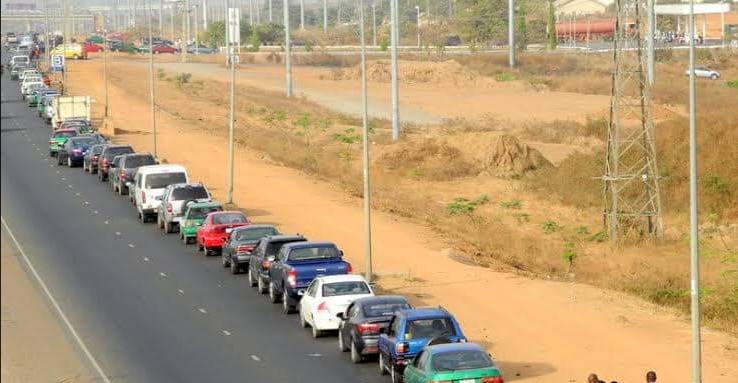Business
Fuel price hike : Long queues resurface at petrol stations

Fuel marketers have urged Nigerians not to blame filling stations for the recent surge in petrol prices, as long queues reappeared at various stations across Lagos, Ogun, Abuja, and Port Harcourt on Saturday.
Many stations remained closed, with operators explaining they were monitoring developments to adjust prices accordingly.
Reports indicate that petrol prices have climbed to between N1,050 and N1,150 per litre, depending on the location. This increase follows a hike in the cost of Premium Motor Spirit (PMS) by the Dangote Petroleum Refinery and other depot owners.
Dealers have attributed the rising prices to the upward trend in crude oil costs. “There is no scarcity of product; filling stations are closed because dealers are observing developments and trying not to incur losses,” a major marketer, speaking anonymously, said.
READ ALSO :Why we’re having issues distributing fuel from PH Refinery – PETROAN
On Friday, the Dangote refinery increased its ex-depot price of petrol from N899 to N955 per litre, leading retail stations to raise their pump prices on Saturday. Some stations that remained open sold petrol for over N1,000 per litre, while others like MRS, which offered petrol at the agreed price of N935 per litre, experienced long queues.
Meanwhile, the Petroleum Products Retail Outlets Owners Association of Nigeria (PETROAN) defended filling stations, citing global crude oil price increases as the primary cause of the hike. PETROAN noted that Brent crude, the global benchmark, is trading at $80.85 per barrel, with WTI oil at $78.82 and the OPEC basket at $81.72.
“The rising cost of crude oil directly impacts domestic fuel prices,” said PETROAN President, Dr. Billy Gillis-Harry. He explained that under the Petroleum Industry Act, petrol prices are now determined by market forces, meaning government intervention is limited.
“It’s no longer funny; even retail outlet owners are affected by this up-and-down movement of prices. It affects our business,” Gillis-Harry added. He emphasised that marketers cannot sell fuel below their purchasing cost.
To address the issue, PETROAN has called for the privatisation of government-owned refineries and increased competition in the downstream sector. According to Gillis-Harry, privatisation would improve efficiency, reduce costs, and create a more stable market for consumers.
He also urged the government to create a conducive business environment by providing affordable financing and improving infrastructure. “This will help lower the costs of running retail outlets and make petrol more affordable for Nigerians,” he said.
At the inaugural meeting of the Petroleum Industry Stakeholders’ Forum in Abuja, PETROAN presented a position paper advocating strategic collaboration and investment in Nigeria’s petroleum sector. Gillis-Harry commended President Bola Tinubu’s policies, including the deregulation of the petroleum industry and unification of foreign exchange rates.
The association also outlined recommendations to strengthen the downstream sector, including monitoring operators’ performance, combating cross-border smuggling, and ensuring local refineries have access to crude oil. PETROAN reaffirmed its commitment to supporting initiatives that promote sustainability in the petroleum industry.
“Our role as a critical stakeholder is to ensure smooth distribution and support the industry’s growth,” Gillis-Harry concluded.
(PUNCH)





















